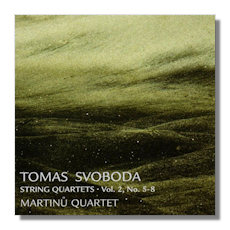
The Internet's Premier Classical Music Source
Related Links
- Svoboda Reviews
- Latest Reviews
- More Reviews
-
By Composer
-
Collections
DVD & Blu-ray
Books
Concert Reviews
Articles/Interviews
Software
Audio
Search Amazon
Recommended Links
Site News
 CD Review
CD Review
Tomás Svoboda

String Quartets, Volume 2
- String Quartet #5, Op. 180
- String Quartet #6, Op. 185
- String Quartet #7, Op. 187
- String Quartet #8, Op. 190
Martinů Quartet
North Pacific Music NPMLD031 76:14
All of Tomás Svoboda's (b. 1939) quartets except for the first have been composed since 1997. In 2007 I reviewed this prolific composer's first four quartets, along with other works by him. That review included some biographical information and can be found here.
These quartets were composed between 2003 and 2006. Quartets #5-7 are each in three movements and #8 is in a single movement. The booklet included with the CD has notes – unsigned but surely by the composer – about each of these works, not only about their stylistic characteristics, but describing with unusual openness what each of them means to Svoboda. Such descriptions make the reviewer's task immeasurably easier and should also greatly add to the listener's understanding and appreciation. As with his 4th quartet, Op. 179 some of these reflect the composer's personal concerns and reflections on observed or experienced events. It is helpful to recall that, although he has lived in the U.S. for the past four decades, Svoboda's origins were in Eastern Europe.
Quartet #7 (2005), based on a folk music heritage, is a tragic view of the erosion of folk elements in music through "the accelerating globalization of communication and culture." The first movement features a folk tune which is rudely commented on with "sarcastic staccato chords." In the second movement a theme played by the solo cello which Svoboda calls "arrogant," but which I would say is initially confident, and accompanied by a tremulando and then quiet melodic fragments from the first violin. However, aggressive new voices turn the music dissonant. When a quicker folk melody appears, "unfinished phrases and chaotic harmonic relationships weaken its character and identity," and when the opening theme is played by the whole quartet the harmony is discordant. In the final movement "a lively optimistic theme is gradually and relentlessly undermined…" until it becomes "chaotic and disoriented" with respect to its folk idiom.
Quartet #6 (2005) is a homage to Shostakovich and some of that composer's stylistic practices are suggested in it. An atonal opening for the viola represents a lonely individual's "struggle to create and survive" in adverse circumstances. Tonal ambiguity establishes tension and conflict in the work. The second movement is avowedly "brutal," with short driving phrases which further suggest tension and disorientation. The individual voice is overwhelmed.
Quartet #8 is overtly autobiographical in intent, opening with lyrical reflections on the composer's early life in Prague, and then on his experiences as a freedom-seeking immigrant and a long-standing citizen of a new country who nevertheless feels pain and conflict on account of physical separation from the land and culture he had earlier found his own. At the end peaceful memories prevail.
Quarter #5 is quite different from the others and is composed in a neo-renaissance style, beginning with a stately dance in a measured but compound rhythm. The tonality is modal with some unusual shifts. The middle movement is meant to suggest the timeless energy of the ocean and the final movement returns to human energies, expressed in rapid and vigorous triple meter.
All that remains for me to say is that these are strong, varied works by a composer of great energy and imaginative range. The performances are authoritative and the recording certainly conveys the strength and vigor of the works. Recommended.
Copyright © 2010, R. James Tobin













